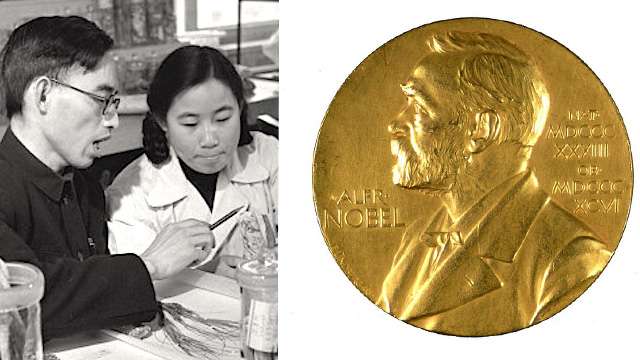PHOTO CREDIT: Robert Fisher Rare Book Library
120 years ago tomorrow, the first Nobel Prizes were awarded, including the first one in Physics for the discovery of X-rays.
Alfred Nobel, a Swedish chemist, engineer, poet, and the industrialist who invented dynamite, arranged in his will to spend money to establish a foundation to honor "those who have conferred the greatest benefit to Mankind."
He bequeathed money to award 5 separate prizes—in Physics, Chemistry, Medicine, Literature, and Peace—which are regarded as the most prestigious honor for anyone in those fields.
Each awardee receives a gold medal, a diploma (see below), and 10 million Swedish krona (about $1.1 million).
Of the 975 Nobel laureates named since 1901, 28 were organizations, and 58 were given to women, including the physicist and chemist Marie Curie, who won twice. Curie's husband shared one of Curie's Prizes—for physics—and their daughter, Irène Joliot-Curie, was awarded her own Nobel in Chemistry for her work on radioactivity.
Another chemist, Linus Pauling, is the only person to win two unshared Nobel Prizes—one for Chemistry and the 1962 Peace Prize.
The youngest laureate was 17-year-old Malala Yousafzai who won the Peace Prize in 2014. Other notable Peace Prize laureates include Anwar Sadat and Menachem Begin, Lech Wałęsa, Martin Luther King Jr., Desmond Tutu, and Jimmy Carter.
The Swiss International Committee of the Red Cross is the only 3-time recipient of the Nobel Prize, being conferred with Peace Prizes in 1917, 1944, and 1963. Further, the humanitarian institution's co-founder Henry Dunant won the first-ever Peace Prize in 1901.
In 2020, two women, Jennifer Doudna and Emmanuelle Charpentier jointly shared the Nobel Prize in Chemistry becoming the 6th and 7th women (after Madam Curie) to win that category, for their "development of a method for genome editing—commonly known as CRISPR.
In 1969, an additional prize category for economics, and it became another honor that is also available, after the Bank of Sweden began providing funding for it.
But, not every category is awarded annually. During the World Wars, they were rare, and when the Nobel committee doesn't believe anyone attained the degree of achievement in the prior year, no Nobel is awarded. That has happened 49 times.
The U.S.A. is the country of birth for the most winners of the Nobel across the globe—around 30%—followed by the UK, France, and Germany, where, during a 2-year period, Adolf Hitler refused to allow three laureates (one in medicine, and 2 chemists) to accept their awards. Boris Pasternak, the 1958 Nobel Laureate in Literature (for Doctor Zhivago), was also coerced by the Soviet Union to decline the Prize.
Hope you enjoyed this article, which is a reprint from the daily history column written by WS founder, Geri Weis-Corbley, Good News On This Day in History, where you can check out your birth date column—or get the free WS app to easily see the history column and all our good news on any device.
SHARE the Nobel Fun Facts With History Buffs on Social Media…










Be the first to comment